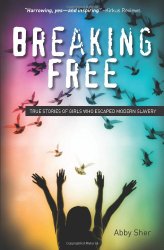
 Breaking Free
Breaking FreeTrue Stories of Girls Who Escaped Modern Slavery
Review posted April 4, 2015.
Barron's, 2014. 226 pages.
Starred Review
Wow. I intended to read this book slowly over a long period of time, as I do with most nonfiction. But the stories are riveting. Today after dipping in less than halfway through, I sat down and finished the book.
The book tells the true stories of three women who, as girls, were sold into the sex trade. One of those girls was sold repeatedly by her own parents -- in America. All of them were trapped by circumstances beyond their resources -- but all of them did eventually escape.
Reading this book will open your eyes. I am horrified that such things could happen to young girls today. I am happy to say that many resources are listed at the back to enable the reader to do something to help. You will want to do something to help as soon as you read it.
Here's what the author has to say in the Preface:
Sex trafficking happens all over the world, including here. Sex trafficking is defined as the act of forcing, coercing, or conning someone into performing any sexual act. According to U.S. law, anyone younger than eighteen who is selling or being sold for sex acts is a victim of sex trafficking, whether it's done by force or not.
The girls and women in these pages are not only brave survivors of sex trafficking; they are also inspiring leaders in the anti-trafficking movement. After they broke free, they chose to dedicate their lives to activism to help other sex-trafficking victims become empowered survivors, too. They each work every day with the hope of creating a world where sex trafficking has been stopped once and for all. They speak to everyone from convicted traffickers to the leaders of the United Nations, because they know that change can only happen when we all work together....
It's much easier to see survivors of sex trafficking as superhuman warriors, or their stories as too horrible to be true, but that only makes it easier to think of sex trafficking as someone else's problem. Superheroes wear jetpacks and capes and appear in comic books. They don't need help, except for maybe a sidekick to dust them off when they fall.
Talking to these women made it clear that I had to rethink my image of them and of myself. As I often heard them say, most importantly: We are human, just like you. No matter where we come from, no matter what brought us to today, we are not so different at all....
These women didn't break free from sex trafficking because of any superpowers. They didn't get to fly away in a rocket ship or on some magic carpet. They made it out because they are and always will be human. We all deserve to be treated as humans, not as property. And when nobody was treating them humanely, they found a single friend, a mentor, or an inner voice that screamed I believe in you!
Though the first story comes from a small village with no running water or light bulbs, I hope you'll still see how Somaly's hopes, dreams, and fears could be any little girl's -- anywhere in the world. I hope you'll see how the cycle of human trafficking affects us all, and that to stop it we must believe in one another and in ourselves.
I hope you'll read these words and believe that we all can and will break free.
This is how it starts, by reading one story and seeing how it's your story, too.
And yours.
And yours.
And mine.
And ours.
I love that this book approaches the topic via stories. The stories of three survivors are simply told. Those stories have power, and indeed help you see that they were children just like anyone else -- children caught in a horrible situation.
I have to add: I looked on the book's webpage, and there's a note from the publisher that includes these paragraphs:
Within a few weeks of the book’s release, Newsweek Magazine published an article (May 30th, 2014 issue) reporting that Somaly Mam had fabricated and embellished her life story. As a result, Somaly Mam has resigned as president of her Foundation.
To say the least, this news came as a complete surprise to us. These accusations are extremely disturbing and disappointing, and we sincerely apologize for any alleged fictitious content in our book regarding Somaly’s story. Nonetheless, we continue to believe that the work of Minh, Maria, and other human rights activists and organizations should not be tarnished as a result of these revelations concerning one individual. The work they do to rescue girls who have fallen victim to the scourge of human trafficking can and should be respected, even in light of this recent development.
Somaly's story is one of the three featured in this book, and the one of the three that didn't happen in the United States. And whether it is true or not doesn't change the horrible statistics given about human trafficking at the back of the book.
May we do everything we can to stop this from happening.
A good way to start is to read these stories.
